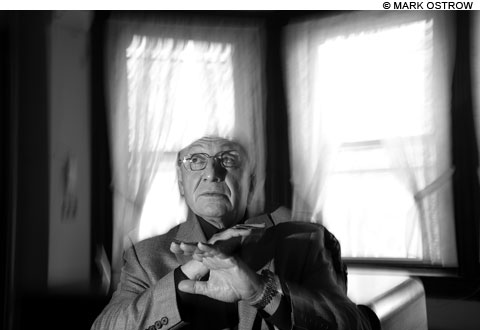
THE PAIN IS GONE Yefim Shubentsov, the "Mad Russian," doesn't consider himself a hypnotist, but instead someone who uses "bio-energy" to cure people of their wicked habits.
|
I sit with a group of 19 others in a semicircle in what looks like a living room in a brick Brookline walk-up. The smell of old cigarettes lingers on our clothes. All eyes are on the Mad Russian, an exceedingly neat bald man in a checked blazer sitting behind a massive wooden desk at the front of the room.The Mad Russian asks who is here to quit smoking. We all raise our hands. He asks each of us if we suffer from any psychological maladies. Do we have anxiety? Yes, we all have anxiety. We are all on medication. We are all in psychic pain.
After that, things get a little fuzzy. The Mad Russian speaks in a singsong that sounds like half English, half Russian. We are asked to hold a small statue of a composer. We are told that soldiers only eat three meals a day. We are told to close and open our eyes, to look at the oil paintings that line the walls, which we learn the Mad Russian has painted himself.
The Mad Russian asks if we have any physical pain. He raises and lowers his right hand while waving his fingers, playing the strings of an invisible harp. Do you still feel pain? No, the pain is gone.
Suddenly, I snap to alertness and notice everyone around me looking like they just woke up from a nap. What just happened?
And why don't I feel like smoking anymore?
LOOK DEEPLY INTO MY EYES
That morning in Brookline is my first introduction to the strange world of hypnosis: a weird realm of trances, shag carpeting, and bad Web sites.
Hypnosis, by definition, is an extremely suggestible state of consciousness. As a physical phenomenon, it's a hard thing to pin down: who can tell if you're hypnotized or just really relaxed? As a cultural practice, it inhabits a weird space between medicine, self-help, showbiz, and the occult.
While it has roots in 18th-century pseudoscience, today hypnosis is standard operating procedure at a number of hospitals, including Mass General. Today's doctors use hypnosis to reduce stress over medical procedures, treat gastrointestinal problems like Irritable Bowel Syndrome, and relieve allergies. Of course, hypnosis is widely used outside the medical field for weight loss, and as a cure for addictions like smoking. That's where I came in.
For the past 17 years, I have been a vigorous and enthusiastic smoker. I can't remember the first time I smoked a cigarette. I would have just started high school, so I must have been 13 or 14. I remember smoking cigarettes and drinking strawberry Mad Dog in the apocalyptic filth and humidity of North Avenue beach. I remember smoking cigarettes on the wheelchair ramp at the rec center after Battle of the Bands. I remember sitting in my bedroom smoking cigarettes listening to Daydream Nation, and writing stories in which all my enemies died in a global catastrophe and I was the only girl left standing.
When other, lesser smokers stopped, I kept puffing: long past college, grad school, and my 30th birthday.